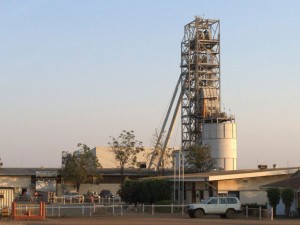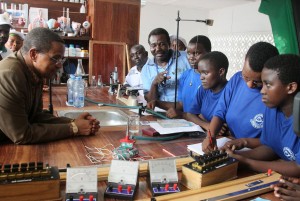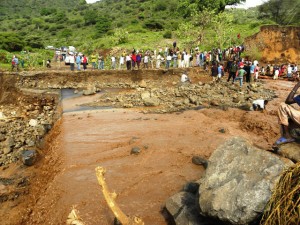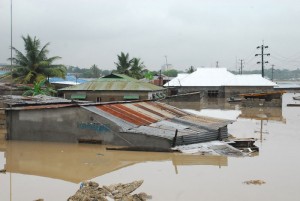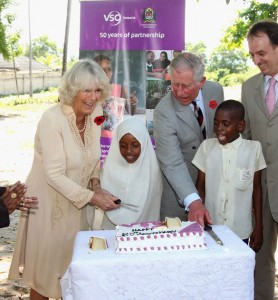Compiled by Donovan Mc Grath
To our readers: We need to broaden the sources on which this column is based. If you see an interesting mention of Tanzania in the newspapers and magazines you read, please let us know or send us a copy. Many thanks. Editor.
Ali Sultani: The unrepentant Zanzibari revolutionary – East African (March 14-20, 2011)
This article, which includes a conversation between the subject and a US diplomat code named ZAO (carried verbatim from Wikileaks), graced the entire front page and the next two pages of EA.
Extract: ‘Ali Sultani was one of the leading figures of the 1964 Zanzibar Revolution, but later spent eight years in prison as one of the conspirators of President Abeid Karume’s assassination (father of the current President Amani Abeid Karume)… He is outspoken and angry about the present state of Zanzibar. He hopes for political change, yet sees little difference between ruling party CCM and opposition CUF…’
Ali Sultani’s maternal grandmother’s first marriage was to Sultan Ali ibn Hamud ‘whom some say was deposed by the British for “decadent ways.”’ Extract continues: ‘… En route to King George V’s coronation in 1911, the Sultan was delayed in Paris. Back home the British engineered a new Sultan to take his place – Hamud’s brother-in-law Sultan Khalifa ibn Kharub (1911-1960). Sultan Hamud died in Paris in 1918, while Ali Sultani’s grandmother meanwhile remarried. From her second marriage came Ali Sultani’s mother, who wed a prominent Arab-Indian businessman from Pemba. Ali Sultani was born there but moved to the main island of Unguja as a child.
Ali Sultani’s childhood best friend was Abdulrahman Mohamed Babu (who became Secretary General of Zanzibar’s first political party, leader of the Zanzibar revolution and a renowned Pan-Africanist) … When Babu went to England on a scholarship in 1952, Ali Sultani followed him … One day in the mid-1950s, the two young Zanzibari students were passing Speaker’s Corner in Hyde Park and heard an impassioned speech by a man from the British Communist Party (BCP). The speaker talked of liberating Africa from the “imperialist oppressors,” a theme that had resonance with the young Ali Sultani, despite his patrician upbringing. Ali Sultani joined the BCP shortly thereafter… Babu later joined the British Labour Party.
In 1957 Ali Sultani paid his own way to attend a Global Youth Conference in the USSR, where he met and befriended what became the pantheon of African anti-colonial revolutionaries: (Banda, Nkomo, Kaunda, Lumumba etc.)… Ali Sultani returned to Zanzibar in 1958 … He immediately became an organiser for, and senior member of, the Zanzibar National Party (ZNP), from which he later founded a sub-sect of Communists called the “Umma” (People’s Party). Ali Sultani claims he was one of the principal ideologues for the ousting of the Sultan of the short-lived independent nation of Zanzibar… In mid-1964, Ali Sultani was sent to be Commissar for Pemba to consolidate the revolution there post-Okello (a Ugandan and main instigator of the violent anti-Arab uprising targeting civilian men, women and children in Zanzibar).
Ali Sultani said he used to personally drive Consul Frank Carlucci [his closest US contact] around during his visits … in Stone Town Carlucci used to be in the habit of jogging in the pre-dawn hours and would usually stop by the back door of Ali Sultani’s house for an hour or so, “until neighbours complained … and fellow revolutionaries began questioning”… By the end of 1964, now Minister of Education of the Revolutionary Government, Ali Sultani gained popularity by securing scholarships for young Zanzibaris in Comintern countries and, later, China. As a delegate to an UNCTAD Conference in Geneva, Ali Sultani met Roberto Mondlane and befriended Che Guevara… Ali Sultani claimed that while he was in Geneva, he and his friend Babu were offered $10,000 by “American agents.” Ali Sultani told Babu that he should take it since “it didn’t change anything.” So they did, splitting the money three ways: Babu used the money to pay for his travels to the UK and Ali Sultani returned to Zanzibar where he gave the remaining third to President Karume…
By 1970 Ali Sultani was Minister of Health. He had picked as his Deputy a younger party member named Hussein Ali Hassan Mwinyi … In the 1970s, Ali Sultani and his Umma colleagues were starting to grow depressed. There was a chronic food shortage, and the public health situation under his watch was deteriorating. “Karume was moving too fast. Change had to be gradual. Furthermore, some of the decisions of the Revolutionary Government just did not seem to make sense. There did not seem to be a systematic or scientific approach toward social change, and the way in which decisions were made became more and more obscure.” His comrades of the Umma began to talk about how to re-align the Revolution back toward its “historical course.”
Ali Sultani said any number of people would have eagerly done-in Karume, but as far as he knew, the triggerman was “a young guy whose father had killed a politician during the British mandate” …
While the assassin’s motive might have been revenge, the Umma plotters’ plan was that after Karume was out of the way, the Army would restore order and restart the “proper revolution” … Ali Sultani claimed to have had nothing to do with implementing any of it. When Karume was killed, the army kept still, but the East German Stasi-trained internal police went to work with vigour… Ali Sultani was arrested while he and his wife were watching an evening movie at the Cine Afrique in Stone Town… He was held for eight years and treated very badly. He said he was beaten unconscious and almost died four times. He said his captors let him write his own confession used for his trial – the only one of the dozens of conspirators allowed to do so, he claimed proudly… In 1980 Ali Sultani was released and deported … on leaving Tanzania he made the Haj to Mecca and then to Britain to “recuperate”…
Ali Sultani had a British wife, but left her and drifted back to Zanzibar in the late 1980s. As a convicted “traitor of the Revolution,” his return was illegal, but his presence was apparently tolerated so long as he kept a low profile. His rehabilitation occurred when Ali Hassan Mwinyi (Ali Sultani’s old deputy at the Zanzibar Ministry of Health) became President of Tanzania and returned to Zanzibar for a “victory lap.” Ali Sultani said he was driving in a remote part of Zanzibar’s interior when Mwinyi’s vast motorcade approached. Ali Sultani said he pulled over, stood by the side of the road and saluted. Mwinyi saw him from the tinted window of his limo, recognised him, stopped the motorcade and doubled back. The two hugged each other on the side of the road. Ali Sultani said Mwinyi’s strap-hangers were shocked to see the president embrace a “known traitor,” but news of the event spread and people no longer shunned him…
Ali Sultani used his connections to Mwinyi and the “Revolution veteran’s network” to acquire land and build two hotels. He is financially comfortable, if not rich, and lives inland in a modest cottage in the “middle class” Zanzibari suburb of Bububu. There he counsels young wannabe politicians, “only when asked,” and settles local disputes, sponsors weddings and sometimes gives money to both the CCM and CUF, although he claims he would never join either party… Since both parties were close in ideology, Ali Sultani said he might support CUF “as CCM reformers,” if it were not for CUF Zanzibari leader Seif Hamad, whom Ali Sultani reviles. “If they could choose a better leader, they might go somewhere,” he said… What was needed was a true national government, “so we can at last fight for an independent nation and fulfil the goals of our revolution.” Ali Sultani is working with an American academic and hopes to publish his autobiography shortly.
Golf has strong roots in EA, going back to the beginning of the last century – East African (September 19-25, 2011)
‘… The oldest course in Uganda, and indeed East Africa, the Entebbe Golf Club, was set up in 1901, when Entebbe was the seat of government, by Sir Harry Johnstone, the British governor of Uganda at the time.’ Three Tanzanian golf clubs – TPC Golf Club, Arusha Gymkhana Club and Dar es Salaam Gymkhana Club – are mentioned in this article :
‘TPC Golf Club, Tanzania (4 stars): Located a few kilometres from Moshi town on the southern slopes of Mount Kilimanjaro on an agricultural estate of 15,800 hectares, out of which 7,700 hectares are under sugar cane, This course is a nine-hole course … “In my opinion, TPC is the best golf course in Tanzania at the moment”, says Mohammed Sadiki [Secretary-General of the Tanzania Golf Union]… Arusha Gymkhana Club (4 stars) is a nine-hole course located in Arusha town … standing out for its scenic views and good course quality. “In my opinion, Arusha is tops in Tanzania when it comes to the scenery of the course, as well as the condition of the club house… Though it only has nine holes, it could have the capacity to host major tournaments.”
Dar es Salaam Gymkhana Club (3 stars): Established in 1926 as a horse riding facility for the then Tanganyika Governor Sir Donald Cameron, this club has an 18-hole course … “The views of the ocean are scenic, and though we’ve seen some improvements, the course still has some challenges in terms of maintenance,” says Sadiki. Over the past few years, the course has changed from its traditional brown to green …’
Bike work: How T-shirt slogan can save Tanzania – East African (September 5-11, 2011)
EA columnist Elsie Eyakuze offers a solution to city congestion.
Extract: ‘Dar traffic, as demonic as it is, has its uses… Recently I was at a junction where the workforce of Tanzania were all stuck waiting for some Honourable or other to slide on through … The Honourable was very late for work, which was costing us all revenue in terms of lost time – his and ours. And: Bicycles for Development! … I happen to be the proud owner of a collectible T-shirt … On the front of the T-shirt is a picture of Julius Nyerere … perched gleefully on an old-school bicycle … It is an iconic photo … During the fuel crisis . . . one issue that didn’t gain much traction in the press, was a push for alternatives that would help reduce our fuel dependence … How about if we inject some public funds … to make those awesome bicycles … a Chinese model … The next phase would involve some aggressive marketing to capture the biggest spender of them all: The Government of the United Republic of Tanzania. A good entry point would be to distribute these bikes for free to public servants, in exchange for their government-provided Toyota Land Cruiser VXs. Yes, suggesting that senior employees of the Tanzanian government humble themselves so far as to ride bicycles in public is tantamount to calling for a civil war. However, I think that the T-shirt provides the ultimate weapon in justification: Nyerere did it… After that, a much more serious campaign could be mounted to get as many citizens and residents onto a bicycle as possible … The money that would result from the sale of the Land Cruiser VXs… would be put in a special fund used strictly to support the improvement of maternal health services in Tanzania. That way, every time you see a Mheshimiwa biking to work, you would be assured that one more newborn Tanzanian and her mother have a fighting chance to survive… And we could all thank that one T-shirt, and by extension, Nyerere. Foolproof, right?’
Dar to deploy troops in parks with poaching out of control – East African (September 5-11, 2011)
Extract: ‘The current price of rhino horn in Asia is $55,000 a kilogramme, making it more expensive than gold or cocaine… Last year poachers killed one of five endangered black rhinos that were relocated to the Serengeti National Park from South Africa. Latest statistics show that 1,370 poachers had been arrested in various national parks and game reserves, and 171 guns confiscated. . .a spokesman said poaching had reached such deadly proportions that the government could not continue relying on park rangers alone to combat heavily armed poachers. The idea of deploying TPDF troops was first floated by President Kikwete when he toured the Natural Resources and Tourism Ministry recently… The military engagement comes amid reports that Tanzania has lost 35% of its wildlife population due to poaching in the past decade.’
Never smile at a donor, he’ll be in your bedroom next – East African (November 14-20, 2011)
EA columnist Elsie Eyakuze writes: ‘… I don’t hold much truck with the word independence because I suspect it misrepresents a few things. First of all, how do we call ourselves independent when so much of our development budget comes from the donor community – especially the former colonial power? The government of Tanzania might be independent in the sense that it collects our taxes and recycles them in to Recurrent Government Expenditures (cars, houses and the other benefits of power that we don’t talk about in polite company). Tanzania’s people, however, are still heavily dependent on donor support for basic goods and services… Development is a heavily hierarchical industry that requires constant vigilance because of the not-so-hidden power dynamics. The attitude of gratitude has no place in these relationships, it creates freakish outcomes. Why else would a British premier get it into his head that he can tell African countries how to legislate their sexual politics and hope to get away with it?’
Eco dream of UK firm wrecks life for African village – Observer (30/10/11)
The collapse of a British biofuel company has left hundreds of Tanzanians landless, jobless, and in despair for the future. “People feel this is like the return of colonialism,” says Athumani Mkambala, chairman of Mhaga village in rural Tanzania. “Colonialism in the form of investment.”… A quarter of the village’s land in Kisarawe district was acquired by a British biofuels company in 2008, with the promise of financial compensation, 700 jobs, water wells, improved schools, health clinics and roads. But the company has gone bust, leaving villagers not just jobless but landless as well. Josie Cohen at development group Action Aid says: “Like it or not, everyone who drives a car or catches a bus is involved in this problem, as all UK petrol and diesel is mixed with biofuels.” …’ Thank you John Sankey for this item – Editor.
Tanzanians most secure people in EA – East African (October 17-23, 2011)
‘This article indicates that the country is committing enough resources towards safety of its people.’ Extract continues: ‘Tanzania leads other East African Community members in ensuring that its citizens are secure, a new report [based on a study by the Mo Ibrahim Foundation] has indicated. The study on national security covered such areas as cross-border tensions, domestic armed conflict and government involvement in armed conflict. On people’s safety, Tanzania ranked high, scoring 49 with Kenya coming last with 31; Uganda had 46, Rwanda 40 and Burundi 34… In the 2011 Ibrahim Index of African Governance, Tanzania was again the top overall performer, coming in at position 13 out of the 53 African countries …’
So, Jay Kay was just a pretty face after all? Damn! – East African (March 28-April 3, 2011)
EA columnist Elsie Eyakuze expresses her opinion on Tanzania’s President Jakaya Kikwete. Extract: ‘… I actually happen to like my Head of State… I am convinced that there is a strong correlation between the uniqueness of a head of state’s fashion statement and the amount of sanity said head of state is likely to display… It is a simple formula: the more accessories, the more outlandish the costume, the crazier the leader is. You will be happy to note that Jay Kay has a penchant for ankle boots, which is nothing to write home about… Just after the elections that enthroned him in 2005 … Jay Kay was the toast of the Swahili coast. He was a breath of fresh air in an establishment that seemed to be going down the drain. He was dynamic, charming, smiled a heck of a lot more than his predecessor. The media couldn’t get enough of him and neither could we. Sure, some of us heard rumours – about his lack of vision and resolve, his inability to control the party, a certain unfortunate disinterest in the nitty-gritty of governance… But he was pretty and he was fun …
Fast forward to 2011, and the picture is no longer promising… These days, the only papers that put Jay Kay on the front page as a matter of course are owned by the establishment… Jay Kay is looking tired and unfocused. Worse yet, I suspect he is being overshadowed by his prime minister, who projects mature leadership with such confidence it is hard to believe that they are only a year apart in age. Our handsome charmer is turning out to be exactly that – a pleasant and largely ceremonial ornament… I already know what I’ll remember fondly from the Kikwete years: His (mostly) fearless backing of media freedoms through personal example, his accessibility to the common man and his democratic nature… Kilimo Kwanza? Jay Kay’s Billions? … Maybe Jay Kay will go home without a grand opus to show for his stint at Ikulu. But you know what? At least he was as pretty as a cake in a bakery window.’
100 Most Influential People of Africa – New African (June 2011)
This is the headline that graced the front cover of the ‘bestselling pan- African magazine’. Due to space constraints, only Tanzanians will feature in the following extract:
‘Dr Asha-Rose Migiro: Appointed Deputy Secretary-General of the United Nations in 2007 … the first black woman to hold this esteemed position. A lawyer by profession, she has a special interest in issues around peace and the elimination of violence and discrimination against women…
‘Dr Frannie Léautier: Executive Secretary of the African Capacity Building Foundation [and a former vice president of the World Bank]… This powerful but softly-spoken and humble woman has totally transformed the face of the ACBF, to the extent that today, when she speaks, big men sit up and listen…
‘Ndesanjo Macha: A popular blogger, journalist, lawyer and digital activist. Ndesanjo set up Jikombe (Swahili for “Free Yourself”) the first ever blog in an African language…’
January Makamba: Parliamentary Energy Committee Chairman, Tanzania – The Africa Report (Dec 2011-Jan 2012)
Extract: ‘Becoming MP for Bumbuli at only 37, January Makamba is a rising star of Tanzania’s Chama Cha Mapinduzi (CCM) party and chairman of the Parliamentary Energy Committee. He is the son of the 46 Tanzania in the International Media recently ousted CCM secretary general Yusuf Makamba… He turns 40 in 2015, the year of the next presidential election, and bloggers have started discussing how his candidacy might transform local politics… He is the first Tanzanian politician to set up a corporation for his constituency. The Bumbuli Development Corporation will invest $10m, borrowed from Wall Street philanthropists, in East African treasury bonds and stocks.’
MV Liemba: The Oldest Operating Ship in Africa – Habari (Swedish- Tanzania Society, 3/2011)
The MV Liemba has already been featured in TA (Issues No 3, 4, 21, 29, 34, 64, 87, 98!). The following extract contains the latest development in the story.
Extract: ‘The Tanzanian Government is currently holding talks with the German Government to see the possibility of the latter financing major rehabilitation of MV Liemba. MV Liemba is of immense importance to Tanzania linking other neighbouring countries for handling passengers and transit cargo to Zambia, East Democratic Republic of Congo (DRC) and Burundi. The technical status of MV Liemba needs to be improved so that she may continue providing the service. Thus, major rehabilitation of MV Liemba will improve performance of the rail system, bring down maintenance costs, attract more customers due to greater reliability of service and will encourage Zambians, Congolese and Burundians to use Dar es Salaam Port thus boosting the Tanzanian economy… Installation of new engines in the vessel will minimize emissions of hazardous smoke into the atmosphere and the present oil-spill from worn out engines will be minimized.’
Dikakapa Tour – Botswana Daily News, 17 November 2011
The Botswana traditional music group, Dikakapa, recently toured Tanzania performing in Dar es Salaam, Bukoba, Opunga, Nyimanye, Ndeya and Songea. Grace Ramaphoka, a member of the group, said more than 3,000 spectators attended each show. which was far more than they would have back home where they would normally count 100 people; “if only people in Botswana would be so enthusiastic then the industry would grow to become a global brand.” She also said that there were a variety of performances by Tanzanian traditional music artists.



